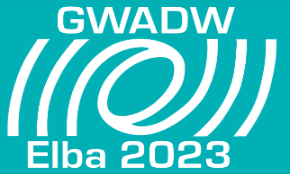Speaker
Description
The absorption of laser power in the core optics of ground-based gravitational wave detectors induces thermoelastic deformations and changes of the optical path length, that add up to mirror manufacturing defects causing deviations from the ideal optical configuration of the interferometer and worsening its performances. To mitigate these distortions a thermal compensation system (TCS) has been implemented in Advanced Virgo. TCS is currently designed to deal with axisymmetric wavefront distortions that represent the main contribution to the aberration budget. However, in view of the input power increase foreseen in the observing run O5 an adaptive control of residual non-axisymmetric optical aberrations is known to be necessary. Deformable Mirrors (DM) have been studied as possible actuators. The main advantage with respect to scanning beam actuators is that the DM correction does not introduce additional frequency-dependent noise. A Modified Gerchberg-Saxton (MoG-S) algorithm based on the measured device influence function matrix has been developed to extract the phase to be applied by the DM to obtain the heating pattern required for a complementary wavefront correction of the non-axisymmetric aberrations. We present the MoG-S simulations of the DM-based system and the results of the experimental tests.

